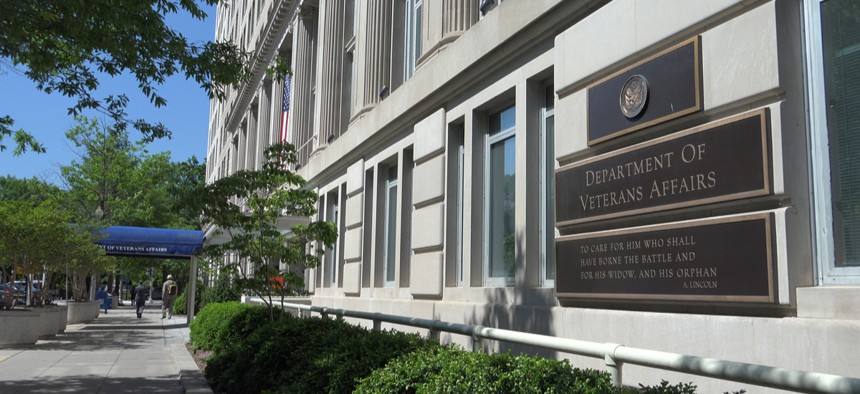Audit: Veterans Affairs IT Security Officials Have A Lot Of Work To Do

bakdc/Shutterstock.com
The annual FISMA report includes 29 recommendations to fix significant security weaknesses in eight areas.
The Veterans Affairs Department continues to have significant security weaknesses, including previously flagged flaws that have yet to be fixed, according to the results of its annual IT security assessment.
“VA continues to face significant challenges in complying with the requirements of FISMA due to the nature and maturity of its information security program,” according to the report, which was prepared by CliftonLarsonAllen LLP and reviewed by the VA inspector general before being released Friday.
The report offers 29 separate recommendations for improving the department’s cybersecurity, though the thrust boils down to three “specific actions”:
- Address security-related issues reported in previous audits.
- Improve deployment of security patches, system upgrades and system configurations to be consistent at headquarters and all field offices.
- Improve monitoring of controls at all facilities and communications with department personnel who can mitigate or close security gaps.
VA IT leadership agreed with all but one of the recommendations in the report—though they disagreed with certain aspects of four others.
The department disagreed with the auditors’ final recommendation to encrypt and otherwise secure sensitive data. IT officials said this recommendation—which had been issued in previous FISMA reports—had been resolved as of March 2017. Upon further review, the auditors agreed and closed the recommendation.
Department officials provided plans to remediate the other outstanding issues. The auditors said the plans are sufficient but withheld full praise until they see results.
The auditors broke their findings into eight areas of concern for VA to address:
Agencywide security management program: The department has an Enterprise Cybersecurity Strategy Team working on 31 plans of action to close specific weaknesses in the VA’s security. The team is making progress, according to auditors. “However, the aforementioned controls require time to mature and demonstrate evidence of their effectiveness,” they wrote. “Accordingly, we continue to see information system security deficiencies similar in type and risk level to our findings in prior years and an overall inconsistent implementation of the security program.”
Auditors made six recommendations in this area.
Identity management and access controls: The audit found “significant information security control deficiencies” in the department’s access management programs, which determine who has access to VA systems and what those persons are allowed to do on those systems. Specifically, the department lacks strong password management, access management, audit logging and monitoring and strong authentication, such as using two-factor logins for local networks.
The report includes four recommendations to improve these controls, one for each area identified as deficient.
Configuration management controls: Baseline configurations are used to establish and push minimum security across an enterprise, including areas like access controls and vulnerability patches. The department has specific guidelines on baseline configurations but auditors discovered these baselines are not being adopted or enforced consistently. “During testing we identified unsecure web application servers, excessive permissions on database platforms, vulnerable third-party applications and operating system software and a lack of common platform security standards and monitoring across the enterprise.”
Six of the 29 recommendations focus on remedying this imbalance.
System development and change management controls: The VA has policies to ensure that new systems and applications meet the department’s security standards as they come online. However, the plans, results and approvals for specific projects were often incomplete or missing, according to the report.
“Specifically, at two major data centers and five VA medical centers, we noted that change management policy and procedures for authorizing, testing and approving system changes were not consistently implemented to support changes to mission-critical applications and networks,” auditors wrote.
Auditors made a single recommendation to better enforce department policies, which they noted is a repeat recommendation from previous FISMA reports.
Contingency planning: Auditors noted the department has contingency plans to secure and recover veteran data in case of a major systems failure. However, those plans have not been fully tested and are inadequate in places, they said. For instance, officials at two data centers and 12 medical centers failed to encrypt backups for mission-critical systems that were being transported to a storage facility.
Two recommendations were made in this area, one specific to encrypting backups and another to improve testing of contingency plans.
Incident response and monitoring: The department has made significant progress in this area, auditors said, but there are still improvements to be made. Investigators conducted four network scans during the course of the audit, none of which were picked up by VA cybersecurity.
“During testing, we were able to exfiltrate a file that contained mock data including formats resembling social security numbers, email addresses and passwords,” the report states.
The department is also failing to fully monitor sensitive network connections with VA business partners, auditors said. They made four recommendations in this area, all of which were recommended in previous reports.
Continuous monitoring: VA has made progress in this area, as well, but it has been inconsistent. The department does not have a “comprehensive continuous monitoring program” that could identify abnormalities in the system, ensure consistent patching across the network or find and remove unauthorized applications.
Auditors made two recommendations—build comprehensive white and black lists for applications and a process to fully inventory software across the enterprise.
Contractor systems oversight: Finally, the auditors assessed the department’s oversight of vendors that work with or on VA networks and maintain at least some amount of government or patient data. The audit found the department lacking, specifically when it comes to its cloud services.
“VA did not have adequate controls for monitoring cloud computing systems hosted by external contractors,” the report states. “Consequently, we identified numerous critical and high-risk vulnerabilities on contractor networks due to unpatched, outdated operating systems and applications.”
The report includes two recommendations to improve contractor oversight and reporting.
NEXT STORY: DHS seeks growth in cyber budget






